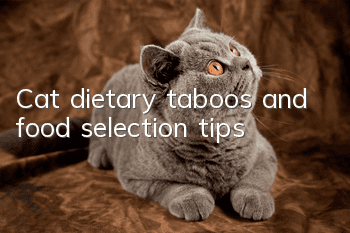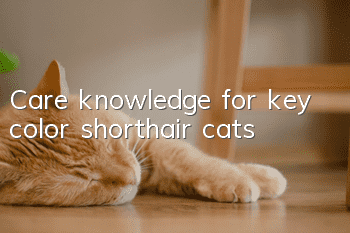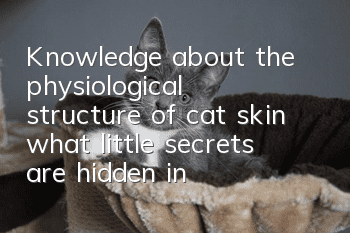Cat dietary taboos and food selection tips

The same food, prepared in different ways, or combined in different ways, will have different effects on cats. Cats are more picky about food than some other pets, so how to choose food for your cat is a science.
1. Master the main dietary points of cats
1. Balance of diet and exercise
Domestic cats are prone to lack of exercise, especially if they are often fed high-calorie food or food eaten by humans, which often leads to cat obesity. If a cat is too obese, it will suffer from diabetes, heart disease, and a high mortality rate.
2. Supply sufficient water source
Cats, like all living creatures, need to drink water. Water can decompose and transport nutrients and waste products inside the body, helping the body to metabolize deeply. Therefore, it is very necessary to prepare fresh and sufficient water for cats every day.
2. Misconceptions about pet cat diet
1. Cats like to eat fish the most
Fish can provide good protein and other nutrients, but excessive amounts can be harmful to health. If cats eat too much for a long time, it will cause yellow fat disease. The cause is insufficient vitamin E in the food, which will produce a painful inflammatory reaction.
2. Cats need to drink milk
Many cats are lactose intolerant. Because cats do not have lactase enzyme, they cannot digest the lactose in milk. Therefore, they will have soft stools or diarrhea a few hours after drinking milk. Special attention should be paid to avoiding drinking milk if this occurs.
3. Cats can only be vegetarian
Nutritionists say that cats themselves cannot synthesize the taurine and eicosadonic acid required for health, and these two nutrients can only be supplied by animal meat and fat, so cats cannot survive on a vegetarian diet.
4. Same food for dogs and cats
The nutrients that dogs and cats need are different from those that cats need. Cats must obtain higher amounts of protein, B vitamins, preformed vitamin A, taurine, and eicosadonic acid from their diet.
5. Lower urinary tract diseases
Many owners believe that low ash cat food or low magnesium cat food can prevent lower urinary tract disease in cats. In fact, lower urinary tract diseases in cats cannot be eliminated by low-ash cat food. Cat food with low magnesium content that can make urine acidic can prevent magnesium ammonium phosphate uroliths.
Magnesium ammonium phosphate uroliths are a major cause of lower urinary tract disease in cats.
6. Cats need catnip
About 50% of cats like to scratch and bite catnip, but this does not mean that cats can stay healthy by eating it. In fact, catnip is a plant that can cause hallucinations. Some cats may cause temporary behavioral changes after eating it.
Catnip can cause cats to sneeze, chew, rub, roll, meow, utter delirium, etc.
3. What foods should kittens avoid?
1. Bird or fish bones
Bird bones will have sharp fragments after being chewed into pieces. These fragments may injure the cat's mouth or internal organs, and fish bones that most people mistakenly believe are also dangerous.
2. Seafood preparation methods
Raw cuttlefish and squid can easily cause gastrointestinal disorders, but they can be eaten after being heated; dried squid will absorb water in the stomach and expand; the internal organs of shellfish such as nine-hole, snail meat, etc. should be allowed to bask in the sun after eating. It is easy to suffer from dermatitis after eating.
3. Addition of spices
Adult cats only need 0.3 grams of salt per day, so be careful not to exceed this amount. Because spices can dull a cat’s sense of smell, special attention should be paid to the content of spices when choosing food.
4. Eat a small amount of dried fish
It’s not that cats can’t eat dried fish, it’s just that dried fish contains magnesium. A large amount of magnesium is the cause of the formation of urinary stones, so don’t overfeed. This is something you need to pay attention to.
5. Liver foods
Some cats love liver and refuse to eat other foods. Liver contains large amounts of vitamin A, and excessive intake of vitamin A can lead to muscle stiffness, neck pain, bone and joint deformation, and liver disease.
6. Rich in high-fat foods
If your cat's diet contains a lot of high-fat fish or fatty meat, it will cause the cat to be deficient in vitamin E, which will cause inflammation of body fat and cause extreme pain. Therefore, attention should be paid to fat intake.
7. Eating too much raw fish can be fatal
Some raw fish contain enzymes that can destroy vitamin B1, and a lack of vitamin B1 can lead to neurological diseases, which can be fatal. This enzyme can be destroyed by heating, so do not overfeed.
8. Avoid fresh raw meat
Although a cat's diet should be based on meat, it cannot be fed only fresh meat. This can lead to uneven intake of minerals and vitamins, which can lead to severe bone metabolism disorders.
9. Don’t feed dog food
Dog food cannot be used to feed cats because the nutrients in dog food are not enough to meet the needs of cats. Because cats are carnivores and dogs are omnivores, dogs do not have as much nutritional needs as cats.
10. Control the amount of cod liver oil
Caution should be exercised when giving extra vitamins and minerals to cats as they can be harmed if used incorrectly. Excessive consumption of cod liver oil can lead to excessive intake of vitamin A and vitamin D, which can lead to bone diseases..
4. Domestic cats should pay attention to dietary taboos
1. Don’t overfeed eggs
Do not feed your cat more than two eggs a week. Do not feed raw egg white to your cat as it contains antibiotic proteins, chemicals that neutralize the vitamin, preventing the cat from getting this necessary vitamin.
2. Pay attention to food feeding
Cats with bladder disease should not eat dry food. Cats don’t like to eat food fresh out of the refrigerator. If you store opened cat food in the refrigerator, let it sit outside for a while to come to room temperature before feeding it to your cat.
3. Canned cats increase appetite
Cats can often detect and refuse to eat food that lacks certain nutrients. Therefore, it is important to provide cats with nutritionally complete and balanced food. If your cat refuses to eat, try feeding it canned food. This kind of food can arouse the cat's appetite.
4. Boredom leads to anorexia
Cats are extremely picky about their food. Even when they are very hungry, they will not eat food they don’t like. At the same time, if the cat eats the same taste of food for a long time, it will also cause the cat to become bored and lead to a decrease in food intake.
5. Food changes must be gradual
Cat’s food cannot be static, but it cannot change too quickly either. If the taste is the same all the time, the cat will gradually stop liking it. If it changes too quickly, it will not adapt to it, which will affect its appetite. Therefore, when changing the cat's diet, you must have a certain plan, and only gradual changes can be accepted by the cat.
- What causes oral ulcers in cats? How to cure oral ulcers in cats!
- How to potty train a cat
- What should I do if my cat eats a plastic foreign object?
- What is it like to raise a British Shorthair cat?
- Can cats eat popcorn? Is popcorn safe for cats?
- What should I do if my cat is too fat and ruins everything? WOWO cat food is the solution for you
- What should I do if my cat is obese? Never rely on dieting to lose weight
- Why do cats have such good balance? Are cats born acrobats?
- Symptoms of ear mites in cats How to treat cats with ear mites
- What medicine should cats take for periodontitis?



